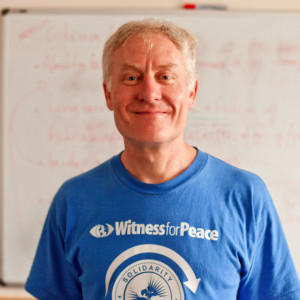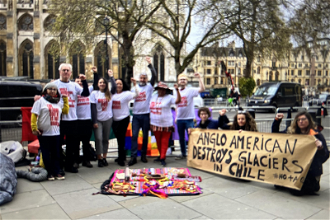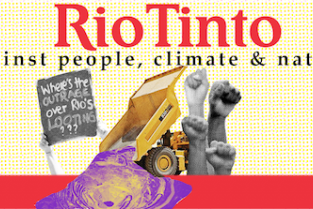Colombia: The fields, the slums and the airport

Richard Solly
In August, I participated in a human rights delegation to Colombia. As I was leaving Colombia after the delegation I was reminded of a deeply disturbing truth. I was waiting for my flight at the international airport in the country's capital, Bogota, looking for a shop where I could buy toothpaste. Although the language, the souvenirs on offer, and the names of the shops were all different, the airport could just as well have been in Europe or North America. That airport is part of the so-called First World, just like so many international airports. And the people who use it, including me, are also part of the First World.
The airport is in a relatively prosperous part of Bogota, but the city's population has swollen in recent years as rural people displaced by injustice, death threats, forced removal and armed conflict move in to the urban slums in the hope of finding greater safety and some opportunity to make a living. These people do not use the airport unless they manage to find employment there.
The global economic system which spawns international airports, with the globetrotting travel culture which accompanies it, is of course not primarily organised to benefit human rights activists, environmentalists or anti-corporate campaigners. It is primarily organised to benefit the world's ruling elites, particularly in centres of metropolitan power in Europe and North America. It operates at the direct expense of people such as my friends in La Guajira, their livelihoods and cultures wrecked by expropriation and forced removal so that people far away can have electricity generated by the coal beneath their soil, and so that shareholders in places far away can make continuous, comfortable profits. This is what 'extractivism' is - the extraction of 'natural resources' by foreign companies at the expense of local people for the benefit of distant elites. It is also 'neo-colonialism', the occupation and control of land by companies based in more powerful countries, for their own benefit rather than that of the local people.
But by the mere fact of living in Britain I derive some material benefit from this injustice. I am in receipt of stolen goods, because the unjust profits made by, in this case, UK-listed mining multinationals, flow to the London Stock Exchange and then get distributed, in part, to the UK government through taxes, to UK pension funds, banks, insurance companies and other investors, and thus benefit the national economy and, as a result, me. We may find we ourselves are investing in these destructive and unjust projects through our own pension funds or because our council taxes support our local council's pension fund and that may invest in them. When I turn on a light, or boil water in my electric kettle, even though I buy my electricity from a 'green' provider, I have no way of guaranteeing that the electricity I actually use has not originated from a power station burning coal from La Guajira: Drax power station in Yorkshire has certainly been an important customer of the Cerrejon mine.
The reason I went to Colombia was to further the cause of justice for communities affected by the Cerrejon mine - but at the airport I felt deeply implicated in the very injustices I was attempting to combat. There I was, safe in a gated temporary community of travellers, protected by my UK passport, while in the nearby urban slums were people who barely had enough to eat and who may well have arrived from the Colombian countryside specifically because the activities of 'First World' multinational companies and their local allies had driven them from their fields in order to annexe their lands for the interests of the extractivist global economy which offered me the possibility of travel while forcing my friends and millions of others into a life of utter uncertainty.
The toothpaste tasted of mint, not of blood, or coal dust, or polluted water - but it represented them.
Richard is a member of Colombia Solidarity Campaign and Co-ordinator of London Mining Network. He is also a member of St Thomas More Catholic parish in Manor House, North London, and of the Community of the Passion.
Links: http://londonminingnetwork.org/2018/08/fear-and-loathing-in-la-guajira/


















